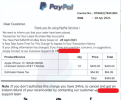britechguy
Well-Known Member
- Reaction score
- 4,029
- Location
- Staunton, VA
This landed in my inbox (and not for the email account which is used with my PayPal account) minutes ago:

Since I've been using PayPal for years, and know the one and only email address that serves as my PayPal account login, I instantly recognized this as a scam. Even the PayPal logo is ever so slightly off.
But, for those who have PayPal accounts they seldom use, and who may not even think about the fact that this message landed in an inbox that's not for the address used with PayPal as a login ID, I can see how it can easily induce panic and get people to call the redacted phone number above.
Another case where, "Stop, breathe, and think carefully before taking ANY action," can save a lot of heartache. It doesn't take much thought to recognize the red flags, but it requires thinking before acting, which is precisely what these scammers are counting on NOT occurring.

Since I've been using PayPal for years, and know the one and only email address that serves as my PayPal account login, I instantly recognized this as a scam. Even the PayPal logo is ever so slightly off.
But, for those who have PayPal accounts they seldom use, and who may not even think about the fact that this message landed in an inbox that's not for the address used with PayPal as a login ID, I can see how it can easily induce panic and get people to call the redacted phone number above.
Another case where, "Stop, breathe, and think carefully before taking ANY action," can save a lot of heartache. It doesn't take much thought to recognize the red flags, but it requires thinking before acting, which is precisely what these scammers are counting on NOT occurring.
